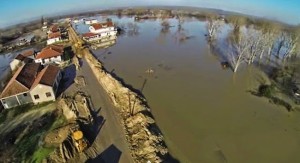The Commission decided to grant aid worth €16.2 million from the EU Solidarity Fund to Greece and Bulgaria following natural disasters that occurred in the winter of 2015. Greece suffered from wide-spread flooding affecting five of its regions, while considerable damage was caused in Bulgaria due to severe winter conditions.
The aid which consists of €9.9 million for Greece and €6.3 million for Bulgaria, will cover part of the emergency costs of recovery operations following the disasters in both countries. In particular, it will help restore vital infrastructure and services, reimburse the cost of emergency and rescue operations and cover some of the clean-up costs in the affected regions.
Commissioner for Regional Policy Corina Crețu said: “The EU Solidarity Fund is one of our strongest symbols of solidarity in times of need. Today we are bringing financial support to the regions of Greece and Bulgaria affected by the disasters of this winter, which caused considerable damage. Now we can start rebuilding, together.”
Many of the programmes co-financed by the European Structural and Investment Funds for 2014-2020 aim to invest in flood prevention and to mitigate against the impact of climate change, for which there is a sustained need.
Background
Greece: From the beginning of February 2015, Greece was affected by wide-spread flooding in the broader area of the rivers Evros and Ardas in the East Macedonia and Thrace Region. The flooding in the Evros basin particularly affected the agricultural sector; about 17 500 ha of land were flooded, destroying farming infrastructure, warehouses and crops. Furthermore, 150 km of roads were damaged, as well as water supplies and sewerage in many buildings.
During the same period, major parts of Central and Western Greece, including the regions of Epirus, West Greece, Central Greece and Thessaly, were affected by similar events. They suffered from heavy rainfall and storms, as well as strong snowfall in the mountains and stormy south winds in offshore and onshore areas. The adverse weather conditions triggered power failures, rivers burst their banks and extensive landslides resulted in a number of mountainous settlements being isolated and inhabitants having to be evacuated. The disaster caused damage to more than 60% of the road network in Epirus. Private homes, shops and other commercial businesses, and farms were affected, and some of Greece’s cultural heritage assets were significantly damaged, including the historic bridge of Plaka, in Tzoumerka which was swept away by the raging waters of the Arachthos River.
Bulgaria: At the end of January 2015, parts of Bulgaria also suffered from heavy rainfall, snow, floods and landslides. As a result, considerable damage was caused to public infrastructure, businesses, private homes and assets, and the agricultural sector was harmed. The South-East region of Bulgaria was the hardest hit by the events. In the city of Burgas alone, over 300 buildings were flooded. Landslides destroyed important infrastructure; dykes broke, many rivers burst their banks and flooded agricultural land and forests. Gusty winds destroyed pine forests, caused power failures that disrupted the communication networks, and roads were blocked by fallen trees.
The EU Solidarity Fund
The total annual allocation available for the EU Solidarity Fund in 2015 is €541.2 million. Adding the remainder of the allocation from the preceding year, the total amount of the EU Solidarity Fund available during 2015 is more than €895 million.
The financial contribution from the Fund is calculated based on the total direct damage resulting from a disaster. This aid may only be used for essential emergency and recovery operations (as defined in Article 3 of the EU Solidarity Fund Regulation).
The EU Solidarity Fund was set up to support Member States and countries applying for EU accession by offering financial support after major natural disasters. The Fund was created in the wake of the severe floods in Central Europe in the summer of 2002.
The revised EU Solidarity Fund Regulation entered into force on 28 June 2014 and simplifies the existing rules so that aid can be paid out more rapidly than before.
Ask me anything
Explore related questions





